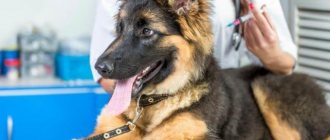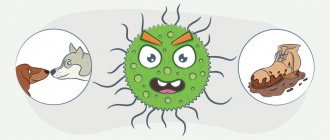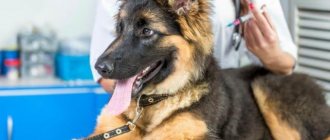Why do you need to vaccinate puppies and adult dogs?
Vaccination helps curb the spread of infections and reduce the epidemiological burden in cities. Vaccines are not drugs and are used solely for preventive purposes. A vaccinated pet is less likely to become infected. When infected, a mild course of the disease without complications is noted.
Vaccination is a prerequisite for traveling abroad, participating in exhibitions and mating with other animals. Regardless, having the procedure done too early in life is a bad idea. Before being separated from its mother, the four-legged baby receives passive immunity along with her milk. After breastfeeding, developing your own immune response does not always work, and then vaccination comes to the rescue.
Why you can’t vaccinate yourself
Vaccination of puppies is a fairly simple procedure. Despite this, veterinarians do not recommend doing it at home for the following reasons:
- Impossibility of obtaining a veterinary passport. This document is issued only by veterinary clinics that have undergone special accreditation. After self-manipulation, the animal will be protected from the disease, but will not be able to travel or participate in exhibitions.
- Possibility of complications. Help for an allergic reaction or anaphylactic shock will be provided faster in a clinic setting.
- Risk of violation of conditions for transportation, storage or use of the vaccine. At best, the desired effect will be lost, at worst, negative consequences will appear.
Before the procedure, it is recommended to undergo a complete examination by a doctor. This will exclude hidden diseases that are contraindications. After the vaccine is administered, the four-legged patient is under the supervision of veterinarians for some time. If his condition is stable, he is sent home.
Can a vaccine cause harm?
The puppy vaccine contains a dead or weakened virus. It is not dangerous for a healthy and strong body, but in a patient it can provoke the development of infection. Contraindications include:
- pathologies occurring in acute form;
- change of baby teeth;
- severe decline in immunity or exhaustion of the body caused by recent operations or illnesses;
- allergic reactions;
- lack of antiparasitic treatment;
- fever accompanied by high temperature;
- 2 weeks before and after tail or ear docking;
- estrus, pregnancy and feeding;
- 2 months before mating.
In all these cases, the body is too weak to fight foreign bodies. To exclude hidden pathologies, blood and urine tests are taken before the procedure.
What diseases are vaccinated against?
It is best to find out what vaccinations your dog needs and when they are recommended to be given by asking your veterinarian. The recommended list includes: rabies, distemper, enteritis, parainfluenza, leptospirosis and infectious hepatitis. The full list of required vaccinations depends on the epidemiological situation and differs by region. The listed diseases can be supplemented by lichen, adenovirus, piroplasmosis or Lyme disease.
Rabies
It doesn’t matter what vaccinations a puppy needs to have in your region - in Russia, rabies is always on the mandatory list. The virus is dangerous not only for animals, but also for humans. Unvaccinated dogs are prohibited from attending exhibitions and crossing the border. Some veterinary clinics refuse to accept unvaccinated pets due to the high risk of infection.
Plague
Canine distemper is characterized by rapid damage to the nervous system, followed by paralysis and cardiac arrest. Ask your doctor in advance when to give your puppy his first vaccination. Up to 3 months, the probability of death reaches 40-100%. Only timely adherence to the recommended schedule will help protect your beloved pet.
Enteritis
Another deadly pathology that threatens young animals and small breeds. Symptoms of enteritis include severe diarrhea and vomiting. Due to the resulting disturbances, the body rapidly becomes dehydrated and exhausted.
Parainfluenza
A viral disease that affects the upper respiratory tract. Accompanied by wheezing, whistling and pain in the sternum. It is especially dangerous for newborns, since with prolonged course it affects the intestinal system.
Leptospirosis
The disease is dangerous for humans - in dogs, cats and people it affects the kidneys, liver and gastrointestinal tract. The causative agent of the pathology is bacteria of the genus Leptospira. They are carried by wild animals and small rodents.
Infectious hepatitis
In young animals the disease occurs in an acute form, and in older animals it occurs in a chronic form. Infectious hepatitis is not dangerous for people, but is often fatal in unvaccinated pets.
Russian legislation
Vaccination against rabies in dogs is included in the mandatory list of vaccinations in Russia. Unvaccinated pets are prohibited from traveling abroad, participating in exhibitions and breeding. They may also be refused admission to some veterinary clinics, citing an increased risk of infection.
Thanks to its consolidation at the national level, the vaccine is administered completely free of charge. This service is provided by regional government clinics. Please note that this social program only applies to vaccines containing rhabdoviruses. Vaccination against other infectious diseases is carried out only on a paid basis.
Vaccination depending on age
When deciding at what age a puppy should get its first vaccination, the veterinarian takes into account individual characteristics and external factors. The general condition of the four-legged patient, conditions of detention and outbreaks of epidemics in the region of residence are taken into account.
First vaccination
Most often, the first vaccination is given to a puppy at 6-7 weeks. At this age, passive immunity received from the mother gradually fades away.
An upward shift in the date is possible with a small litter and an abundant amount of milk in a nursing dog. Postponement of the procedure to an earlier date is explained by early separation from the mother, crowded housing, an imminent change of residence, or an outbreak of an epidemic. In these cases, the Puppy series puppy vaccine, developed specifically for the child’s body, is used.
Second and third vaccinations
The second vaccination is given at 7-8 weeks, the third vaccination is usually complex and includes rabies, it is given at 12 weeks. This period is explained by the low probability of infection of the baby through the main carriers of infection.
In addition to a schedule that takes into account specific diseases, it is important not to forget about revaccination (re-administration of the vaccine). It is carried out 3-4 weeks after the main one to consolidate the result and increase the volume of antibodies.
Vaccination schedule up to a year
Another danger of self-vaccination is explained by an individual approach when drawing up a schedule. Recommended regimens differ even among animals born from the same mother. In addition, the regimen may vary depending on the type of vaccine, especially if they are complex.
What vaccinations are given to puppies up to one year old, using the table as an example:
| Disease | Duration of first vaccination (month) | Revaccination period |
| Rabies | 3-4 | – |
| Plague | 2,5 | 21-28 days |
| Enteritis | 2-2,5 | 21-28 days |
| Parainfluenza | 2-2,5 | 21-28 days |
| Leptospirosis | 2-2,5 | 21-28 days |
| Infectious hepatitis | 2-2,5 | 21-28 days |
Note: the table is approximate, only the veterinarian can determine the exact dates!
Vaccination against other diseases and schedule shifts are agreed upon with the doctor. Carrying out the procedure too early will lead to a collision with passive immunity transmitted through breast milk. In this case, the body will remain vulnerable because it will not be able to create its own antibodies.
Revaccination of adults
The second revaccination occurs at 1 year of age, when the animal is recognized as an adult. It is pointless to get acquainted with what vaccinations are given to dogs by age using the table as an example. The principle of drawing up a schedule is similar, so it is better to ask your doctor all questions.
After 1 year, all further revaccinations are carried out no more than once a year. Exceptions include animals with chronic diseases and weakened immune systems. They are vaccinated every 3 years.
Veterinarians recommend observing seasonality. It is easier to cope with pathogenic infections in summer and winter, since heat and cold effectively kill bacteria and viruses.
Contraindications
Regardless of the type of vaccine, there are contraindications common to all of them:
- Puppies younger than three months of age should not be vaccinated. But this recommendation applies only to prosperous areas. If the situation with rabies in a particular region is critical, the sooner the animal is vaccinated, the better for both it and its owners.
- Sick and weakened animals should not be vaccinated. They still need to be vaccinated, but only after the pet has returned to normal physical shape. The vaccine itself is not at all dangerous for dogs under any circumstances. The problem is that the body of a weakened dog is not able to form normal immunity.
Features of vaccination depending on breed
Breed does not affect the vaccination order. The dosage of the drug is standard for all breeds. Increasing or decreasing the recommended dose may result in a lack of effect or the development of complications.
Exceptions include breeds at risk. But even in this case, all changes are discussed with the veterinarian.
What causes rabies?
The cause of the disease is the rabies virus. In 99% of cases it is transmitted through saliva during a bite. For a dog to get rabies, it must be bitten by an already infected animal . And it doesn’t have to be a dog either. The virus is transmitted by the bite of any other animal carrier (rats, mice, foxes, raccoons, etc.).
A special risk group includes stray and hunting dogs. This is due to the fact that they are more likely to come into contact with animals that may be infected with rabies.
Types of modern vaccines
When choosing a vaccine for puppies, take into account the place of its production and the breadth of its application. These indicators affect the final price, so it is necessary to understand their main differences.
What to choose: domestic or imported product?
Domestic products are always cheaper than foreign analogues. The main advantage of imported samples is their longer existence and a large number of positive reviews. Veterinarians recommend choosing a domestic manufacturer when vaccinating against rabies. After the use of foreign drugs, outbreaks of diseases were recorded.
Mono-vaccines
Single vaccines are aimed at preventing one disease. Their advantage lies in a more gentle effect on the body and better production of antibodies to the selected infection.
When vaccinated with mono-vaccines, it is easier to choose an individual schedule, but the pet will have to undergo many injections. If your four-legged pet experiences stress when visiting a veterinary clinic or you have too little free time, use polyvaccines.
Polyvaccines
Polyvaccines include up to 6-7 fragments of different viral codes. They are more difficult to tolerate by the body, so multicomponent formulations are indicated only for adult animals. For children, drugs containing up to 4 different viruses are used.
The disadvantage of polyvaccines is the possible suppression of some antibodies by others. The rabies virus is considered the most aggressive, so the body directs all its forces to fight this particular agent. In other cases, immunity to several diseases is achieved simultaneously with just one injection.
Effect of the vaccine on the body
When dead or weakened fragments of the viral code are introduced into the body, active production of T-lymphocytes begins - antibodies responsible for destroying the invading pathogen. These antibodies are called memory cells, so if successful, they remember the method of fighting the infection. In case of infection, they give an immediate response, preventing further spread of the virus.
This method of combating infectious diseases is used only for preventive purposes. In case of direct infection, the infected animal is injected with serum - a preparation with ready-made antibodies that forms short-term passive immunity.
Briefly about the main thing
- Vaccinations are a mandatory annual procedure to prevent dangerous infectious diseases.
- It is necessary to vaccinate according to schedule for the drug to be effective.
- A deadly, zoonotic disease on the territory of the Russian Federation is rabies.
- It is better to use an associated vaccine to prevent a number of dangerous diseases
- Weakness and malaise after vaccination are a normal state of any living organism.
- Vaccination against rabies is mandatory and is carried out free of charge in state veterinary clinics.
How does the procedure work?
To avoid complications, it is recommended to follow the recommendations for preparation for the procedure and mandatory quarantine after it. In this case, you don’t have to worry about the health of your four-legged pet.
Preparation at home
Preparation begins 2 weeks before the event. The owner needs:
- Make sure there are no diseases. Check your temperature and stool quality daily. If alarming signs occur, contact your veterinarian.
- Maintain your usual diet. The change is expected only on the immediate day of vaccination. If the procedure is scheduled for the morning, refuse feeding. In the case of an evening recording, reduce the usual portion by ½ with natural feeding and by ⅓ with dry feeding. The last feeding should be no later than 4 hours before vaccination.
- Treat your pet against helminths, ticks and fleas. If infected with parasites, the vaccination period is shifted, and the pet is treated again.
Before the first vaccination, walks and contact with people dressed in outerwear are excluded. An unvaccinated baby should be next to his mother, away from the corridor with street shoes. For preventative purposes, regularly carry out wet cleaning and wash your shoes after going outside.
Choosing a veterinary clinic
Choose an institution that has received a special license to carry out veterinary activities. This guarantees the safety of the services provided.
The procedure can be performed directly in the clinic or at home. The advantage of the first option is a wide selection of equipment needed for complications and the absence of the risk of damage to the drug during transportation. The second option minimizes the stress factor and eliminates the transmission of infection from other four-legged patients.
Vaccine introduction
Typically, the most painful part of the procedure is the needle piercing the skin and/or muscle. The injection itself does not cause pain, so most dogs tolerate the injection calmly.
If a puppy is being vaccinated, it is enough to hold it firmly in your arms. You can wrap a particularly active baby in a towel. But an adult dog of any breed must be muzzled. Even very calm individuals who are not receiving an injection for the first time can become nervous and bite the doctor or owner. Therefore, follow all the rules for visiting the clinic: short leash, muzzle, and sometimes you will need an assistant.
Dangerous and non-dangerous side effects
Due to the activation of protective mechanisms, a temporary decrease in immunity occurs, causing a number of side effects. Non-hazardous ones include:
- one-time vomiting or diarrhea;
- lethargy and fever (not higher than 39.5°C) during the first 3 days;
- loss of appetite (fasting is permissible for no more than a day);
- pain accompanied by barking and whining, or temporary lameness (no more than 4 days);
- the formation of a lump at the injection site, which disappears on its own within a month.
If a month has already passed and the lump has still not resolved, contact your veterinarian. This phenomenon is typical for a benign tumor. Surgery is used to remove it.
Mandatory assistance from a veterinarian must be sought in case of progressive deterioration of the condition, growth and suppuration of the lump, as well as the development of anaphylaxis (allergy).
An allergic reaction is accompanied by swelling and discoloration of the mucous membranes, profuse salivation and difficulty breathing. If these symptoms appear, give the animal an antihistamine and call a doctor immediately.
Cost of vaccine and clinic services
The final price depends on the chosen manufacturer and location of vaccination. Foreign drugs and calling a doctor to your home will cost the most. The most popular vaccines include:
- French Eurican;
- Dutch Nobivak;
- American Vanguard;
- Russian Polivac and Multikan.
The clinic’s services include not only the procedure itself and consumables, but also a preliminary conversation with a therapist. Prices vary greatly by city and region, so it is better to call the clinics yourself and compare the cost of services.
Recovery after vaccination
Quarantine lasts 2 weeks after the procedure. For the safety of your four-legged pet, it is necessary to exclude contact with the outside world, ensure a comfortable environment inside the house and reduce physical activity.
On the first day there is a slight increase in temperature. It will go away on its own after a couple of days.
When can you go for a walk?
It is recommended to walk your pet only on the 4th day after revaccination. In this case, the likelihood of infection from other animals is minimal. If you are vaccinated for the first time, you will have to stay at home for the entire quarantine, that is, 28 days.
When can you bathe a puppy?
Weak immunity is vulnerable to colds, so any draft can end in tragedy. Avoid swimming for 4 days after the injection.
Feeding during quarantine
When feeding, it is recommended to stick to your usual diet. The introduction of new products is fraught with an allergic reaction. If the animal refuses to eat, there is no need to force feed it - it is better to wait until the appetite awakens.
What to do if vaccination is missed
Violation of the recommended schedule leads to a decrease in the effectiveness of the vaccine. Actions in case of absence depend on the amount of time missed.
“
If more than 1.5 years have passed since the last vaccination, then a double injection is required, as for the first time. In other cases, the vaccine is administered as soon as possible, adjusting the original schedule.
Neglecting routine vaccinations for your puppy and adult dog puts not only other animals, but also people at risk.
Despite many controversies surrounding the advisability of vaccination, 90% of vaccinated dogs avoid cases of infection. The remaining 10% experience a mild course, but still avoid death. The article is for informational purposes only.
Contact your veterinarian! Do you like the article? 0
Validity period and frequency of revaccination
Please note that the validity period and frequency of revaccination depends on the specific type of vaccine and this should be found out either from a veterinarian or by reading the instructions for the drug. But the general recommendations of veterinary immunologists are as follows:
- Most modern rabies vaccines last from two to three years. The manufacturer guarantees that at this time there will be antibodies to the rabies virus in the animal’s blood.
- But! At the same time, in most countries the requirement for mandatory annual revaccination is enshrined at the legislative level. The duration of the vaccine does not matter at all.
Moreover, in regions where the situation with rabies is extremely unfavorable, the decision to revaccinate the animal is made based on determining the antibody titer. If the rates are low, then the dog can be re-vaccinated several months after the first vaccination.










